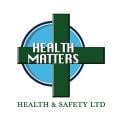IOSH Accredited Moving & Handling 'Training for Trainers' (Client / Patient Handling) - Newry

Health Matters (Health & Safety) Ltd
This IOSH accredited ‘Client Handling Training for Trainers’ course is intended for Healthcare Staff who wish to hold an accredited course and to have the necessary skills and knowledge to carry out their own ‘in – house’ client handling training.
Dates:
- 5th, 12th, 19th, 26th Sep & 3rd Oct 2017
Course Introduction
This IOSH accredited ‘Client Handling Training for Trainers’ course is intended for Healthcare Staff who wish to hold an accredited course and to have the necessary skills and knowledge to carry out their own ‘in – house’ client handling training.
It is also relevant for suitably qualified and experienced Senior Care Staff working in Residential Care Settings, Domiciliary Support, Housing Associations and Private Healthcare Organisations.
Aims
To train experienced and appropriately qualified Healthcare Staff in instructional skills and the theoretical and practical aspects of manual handling of loads and clients to the standard required by the Manual Handling Operations Regulations (1992) and the Safety Health & Welfare at Work Act 2005 ROI to enable them to carry out in-house training within their respective organisations
Objectives
By the end of the course the learner will be able to:
- Discuss up to date legislation relevant to manual handling
- Appraise current research that is pertinent to the practice of manual handling within Healthcare
- Explain the anatomy and physiology of the musculoskeletal system and recommend preventive measures which can reduce the risk of injury among staff
- Explain the manual handling risk assessment process and assist care managers and senior staff to carry out such risk assessments.
- Implement and evaluate evidence based therapeutic interventions and use appropriate equipment in the nursing care of clients with mobility problems.
- Demonstrate effective teaching and facilitation of learning with both individual learners and small groups within the clinical setting.
Method
Theoretical instruction with practical interactive workshops.
As is our company policy, we only ever permit experienced healthcare professionals and other appropriately qualified healthcare staff to attend the Training for Trainers course. This is because there is a legal requirement to ensure that those advising and training others in safer manual handling practice have the appropriate skills and knowledge.
This training can assist trainees to be Manual Handling Key Workers within their respective work environments. The Royal College of Nursing (RCN 2003) defines the term ‘Key Worker’ as an umbrella term used to include those currently known as Manual Handling Link Trainers, Link Workers who take on a local risk assessment and training role within their work area, in addition to their normal job remit, and form an essential part of many organisations risk management systems.
We will require a copy of NMC / An Board Altranais registration and NVQ / FETAC Certification registration, as appropriate, from all participants who are attending our Training for Trainers course to ensure standards are upheld.
Guidance from the Royal College of Nursing, the Chartered Society of Physiotherapists and the Health and Safety Commission give the legal requirements on training in manual handling, and these are as follows:-
There are 6 essential pre-training requisites as follows: -
- There must be training needs analysis carried out to identify what training is required.
- There must be adequate policies and procedures in place tobest practice and staff fitness.
- There must be management commitment and support for the training strategy and service delivery.
To ensure compliance with standards of training and advisory provision each Care Setting will need a robust education programme for staff. Those involved in the provision of training and advice must have adequate time to perform their duties, protected time to provide training and adequate recognition and support.
Training must be specific to staff needs, and be job specific according to level required.
Length of training must be sufficient to encourage and develop a change in knowledge, attitude and skills.
Demonstrations alone are not sufficient; all staff must have time to practice and develop skills under close supervision.
- There must be allocation of sufficient resources by management to implement, develop and deliver the service in accordance with policies and procedures. The suggested minimal duration per person for Nurses and Caring staff is 2 ½ - 3 hours theory and 3 hours practical annually. For ancillary and administrative staff the suggested time for the session is 2 ½ hours to include both theory and practical annually.
- We recommend a maximum of 6 staff to attend each practical training session.
- There must be appropriate numbers of staff to take forward the initiative i.e trainers.
The person specification for a manual handling trainer in client and inanimate handling (foundation level for Healthcare Professionals) is as specified below: -
The Manual Handling Trainer
Must have a recognised, relevant healthcare professional qualification, e.g. nurse, physiotherapist, occupational therapist with at least 1 year experience at senior level within the Care Setting.
This training however, is also relevant for suitably qualified and experienced Senior Care Staff (NVQ level 3 /QCF Diploma level 3/FETAC Level 4 as minimum requirement) working within Residential Care Settings, Domiciliary Support, Housing Associations and Private Healthcare Organisations
Arrangements must be in place to support staff carrying out training also risk assessments of handling activities which are beyond their experience and knowledge base
N.B For Hospital and Nursing Home environments we stipulate that only Nurses, Physiotherapists and Occupational Therapists are involved in training staff in Manual Handling – Safer Client Handling.
- Must have attended a post basic course in moving and handling, including an element of teaching
- Must have experience of working in a healthcare/social care setting
- Should be able to demonstrate knowledge of relevant legal influences in the field, an understanding of ergonomic principles involved, and of the risk assessment processes required.
- Must demonstrate a practical problem solving approach to moving and handling issues
- Must be physically capable of demonstrating good practice. Must promote client independence, minimal lifting, use of equipment and ergonomic changes to minimise risks to staff
- Have effective communication skills so as to ensure they can impart their knowledge and skills in a confident manner to others whilst undertaking their role as trainer.
- Should demonstrate efforts to keep abreast of developments in the field, by attendance at meetings, conferences and seminars, and ideally be a member of the National Back Exchange.
- Health Matters would strongly advise that those involved in the training and advising of others should have membership of a professional or trade union.
All trainers during their 5 - day training will be made aware of the standard elements of the training and the importance of audit and review. A strategy for recall and update for their staff on at least an annual basis must be in place.
It is essential that consideration be given to an individual’s ability to perform i.e.
- Adequate provision of Occupational Health support/advice
- Adequate advice to managers on an individual’s capability to perform safer manual handling techniques following periods of prolonged absence/ill-health
- An appreciation by employees that they must report any physical restrictions which may impact on their ability to practice safer manual handling techniques e.g. pregnancy, back problems, musculo-skeletal disorders.
Materials
Course materials to be provided by Health Matters (Health & Safety) Ltd i.e. training pack.
All Employers to ensure each delegate has access to the Guide to the Handling of People 6th Edition as a training aid and for continuous reference throughout their period as a trainer. We can arrange to have this publication available to trainees at an additional cost.
Certification
An IOSH Client Handling – Training the Trainer certificate is awarded to all who attend the course and successfully complete the written and practical assessments.
To ensure that guidance from the Royal College of Nursing, the Chartered Society of Physiotherapy and the Health and Safety Commission are adhered to, we will require all trainers to attend for 1 day update training on an annual basis with Health Matters plus reassessment by IOSH every third year, or we will be unable to reissue to them a certificate. The three year reassessment must be complete BEFORE your current certificate expires as there is no 'grace period' on renewal.
Course Details
Duration: 5 days (as is recommended by the Standards of Manual Handling 3rd Edition National Back Exchange 2010)
www.healthmattersni.com

